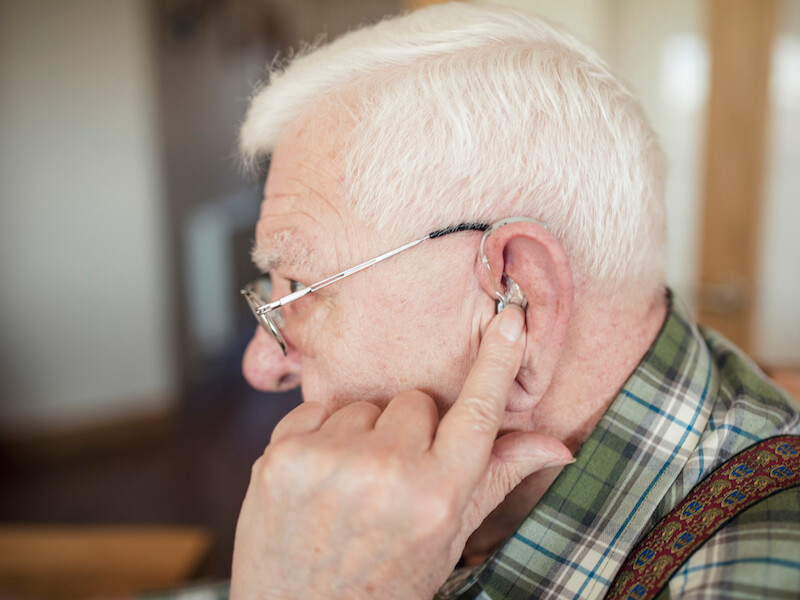
Does it seem like your hearing aid batteries lose their charge too quickly? Here are some unexpected reasons that might happen.How long should hearing aid batteries keep a charge? Between 3 to 7 days is typical. That range is fairly wide. So wide, actually, that it’s unpredictable and puts you in a serious predicament. Things might suddenly go quiet when you’re trying to hear the cashier at the grocery store after 4 days of battery power. Or perhaps on day 5, you’re having an enjoyable conversation with friends when you suddenly feel very alone because you can’t participate because you can’t hear. Sometimes the batteries don’t even make 3 days. Like when you’re watching TV on day 2 and suddenly you can’t hear the show your watching. It isn’t just inconvenient. You simply can’t tell how much battery power your hearing aids have left and it’s making you miss out on life. If your hearing aid batteries are dying too fast, there are a few likely causes.
Moisture Can Deplete a Battery
There aren’t many species that produce moisture through their skin but humans do. We do it to cool off. We do it to clear out excess toxins or sodium in the blood. You may also live in a climate that’s humid and moist. This extra moisture can clog the air vent in your device, making it less efficient. It can even drain the battery directly by interacting with the chemicals that produce electricity. You can prevent moisture-related battery drainage with these steps:
- Open the battery door when you store the hearing aids
- Get a dehumidifier for your hearing aids
- Moist environments, like the kitchen or bathroom are not a good place to keep your hearing aids
- Don’t leave the batteries in when you’re storing them for a few days
Batteries Can be Drained by Advanced Hearing Aid Functions
You get a much better hearing aid today than you did even 10 years ago. But if you’re not paying attention, these advanced features can cause faster battery drain. Don’t quit using your favorite features. But bear in mind, you will have to replace the battery sooner if you are streaming music from your phone all day. Noise-canceling, Bluetooth, multichannel, tinnitus relief — all of these additional features can deplete your battery.
Batteries Can be Impacted by Altitude Changes
Going from a low to high altitude can drain your batteries, particularly if they’re on their older. When flying, skiing or climbing always brings some spare batteries.
Are The Batteries Really Low?
Some hearing aids tell you when the battery is low. Generally speaking, these warnings are giving you a “heads up”. They’re not actually saying the battery is dead. Moreover, sometimes an environmental change in humidity or altitude briefly causes the charge to dip and the low battery alarm gets triggered. In order to end the alarm, take the batteries out, and then put them back in. You might be able to get several more hours or even days out of that battery.
Handling Batteries Improperly
You should never remove the little tab from the battery before you’re ready to use it. Refrain from getting skin oil and dirt on your hearing aid by cleansing your hands before touching them. Don’t ever freeze hearing aid batteries. It doesn’t extend their life as it could with other kinds of batteries. Hearing aid batteries may lose battery power more quickly if you make these basic handling mistakes.
Buying a Year’s Supply of Batteries Isn’t a Very Good Idea
If you can afford to do it, purchasing in bulk can be a smart idea. But the last few batteries in the pack most likely won’t have full power. Unless you don’t mind wasting a few, try to stay with a six month supply.
Purchasing Hearing Aid Batteries on The Web
It’s not an over-all criticism of buying things online. You can get some good deals. But some less scrupulous people will sell batteries on the internet that are very near to the expiration date. They may even be beyond their expiration date. So you need to be careful.
Both alkaline (AA, AAA, etc.) and zinc hearing aid batteries have an expiration date. You wouldn’t buy milk without checking the expiration. You need to use the same amount of caution with batteries. If you’re going to get the most out of your pack, be sure the date is well in the future. It’s probably a good idea to message the vendor if you don’t see an expiration date or better yet, come see us for your battery needs. Only purchase batteries from trusted sources.
Now You Can Get Rechargeable Hearing Aids
Hearing aids may drain too quickly for numerous reasons. But by taking little precautions you can get more life from each battery. If you’re looking to buy a new pair of hearing aids, you might consider a rechargeable model. If you charge them at night, you get a full day of hearing the next day. And you only need to replace them every few years.